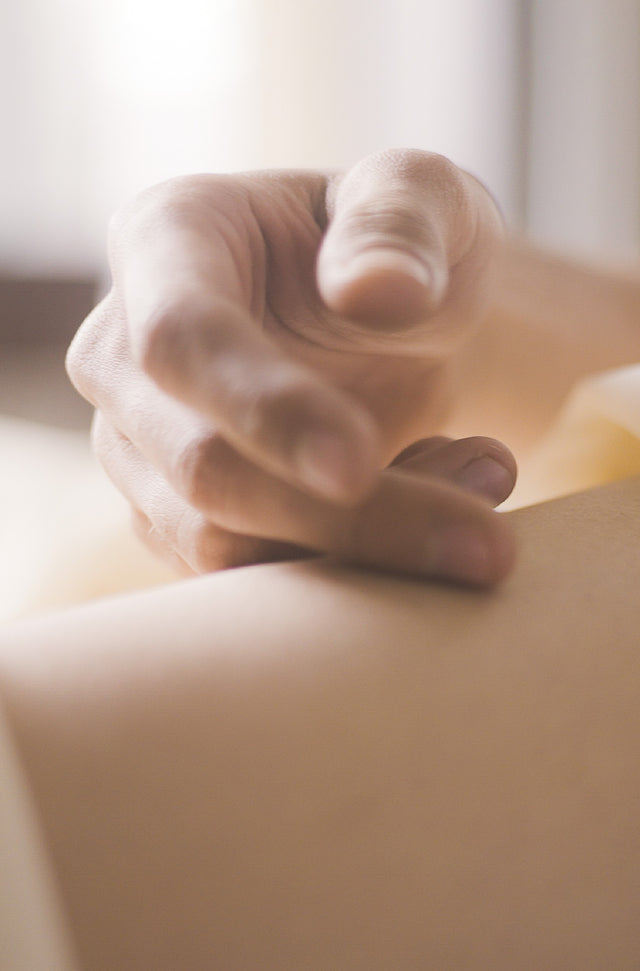How To Reignite Passion And Overcome The Loss Of Libido
Do you remember the last time you felt an irresistible fire burning inside, igniting your senses and bringing you closer to your partner? That unmistakable surge of desire, often referred to as libido, is a powerful force that fuels our intimate connections and enhances our overall well-being. However, there are moments when that fiery flame of desire may begin to flicker and fade, leaving us feeling concerned and disconnected from our partner.
If you've experienced this, you might be encountering the loss of libido—an all-too-common phenomenon that can cast a shadow over our relationships and personal satisfaction.
Are you worried about that?
Well, fret not! In this blog, we will explore the prevalence and consequences of the loss of libido, offering insights and tips to reignite the passionate spark within and overcome this temporary setback.
What Is Loss Of Libido?
Loss of libido, also known as a decrease in sex drive, is a prevalent issue that impacts a significant number of individuals, affecting up to 1 in 5 men and even more women at some stage in their lives. It refers to a decline or absence of sexual desire or interest in engaging in sexual activities. This can manifest differently for each person, but the common factor is a noticeable decrease in the overall desire for sexual intimacy.
What Are Signs And Symptoms Of Loss Of Libido?
Have you ever wondered how to recognise if you're experiencing a loss of libido?
Whether you're a man or a woman, we've got you covered! While the signs and symptoms of loss of libido can vary from person to person, there are common indicators to look out for.
• Decreased interest in or desire for sexual activity.
• Reduced frequency of sexual thoughts or fantasies.
• Lack of arousal or difficulty getting aroused during sexual stimulation is a symptom of a loss of libido in females
• Difficulty achieving or maintaining an erection (erectile dysfunction) is a symptom of a loss of libido in men
• Minimal or no response to sexual cues or stimuli
• Decreased sensitivity or pleasure during sexual encounters
• Lack of initiation or responsiveness to sexual advances from a partner
• Emotional or psychological distress related to the loss of desire
• Feelings of frustration, guilt, or self-consciousness about the decreased libido
• Negative impact on intimate relationships and overall sexual satisfaction
• Changes in mood or overall sense of well-being due to diminished sexual desire
Exploring The Causes Of Loss Of Libido
The loss of libido causes are as follows:
1. Physical Factors
The physical factors that may cause loss of libido in men or women are as follows
• Hormonal imbalances: Fluctuations or imbalances in hormone levels, such as those occurring during menopause or postpartum in women, can lead to a decrease in libido. In men, low testosterone levels can also contribute to a loss of sexual desire.
• Medications and medical conditions: Certain medications, such as antidepressants, blood pressure medications, and some contraceptives, may have side effects that impact libido.
• Lifestyle choices and habits: Unhealthy lifestyle choices can have a negative impact on libido. Excessive alcohol consumption, smoking, drug use, and poor nutrition can contribute to a decrease in sexual desire. Lack of exercise and sedentary behaviour can also affect libido negatively.
2. Psychological And Emotional Factors
Loss of libido can have various causes, and many of them are rooted in psychological and emotional factors. Here are some common contributors to the decrease in sexual desire:
• Stress and anxiety: High levels of stress and anxiety can take a toll on one's libido. When the mind is preoccupied with worries, it can be challenging to focus on intimacy and sexual desires.
• Relationship issues: Difficulties in a relationship, such as communication problems, unresolved conflicts, or lack of emotional connection, can impact sexual desire. A healthy and satisfying relationship plays a significant role in maintaining a fulfilling sex life.
• Body image and self-esteem: Negative body image and low self-esteem can significantly affect libido. Feeling insecure or dissatisfied with one's appearance can create barriers to feeling confident and comfortable during intimate moments.
3. Differentiating The Loss Of Libido In Men And Women
There are some unique factors that are associated with the loss of libido in females and men. Let us take a moment to reveal those factors!
• Understanding the unique challenges faced by men: Men may experience loss of libido due to hormonal imbalances, such as low testosterone levels. Erectile dysfunction or performance anxiety can also impact their sexual desire. Relationship issues, work-related stress, and lifestyle factors can further contribute to the loss of libido in men.
• Exploring the specific factors affecting women's libido: Women may face unique challenges when it comes to loss of libido. Hormonal changes during pregnancy, childbirth, and menopause can affect sexual desire. Psychological factors, such as stress, body image concerns, and relationship dynamics, can also play a role. Additionally, certain medical conditions like polycystic ovary syndrome (PCOS) or thyroid disorders can impact women's libido.
Effective Tips To Overcome The Loss Of Libido
Now that you have a better understanding of loss of libido and its underlying causes, you might be eager to learn the strategies and techniques to overcome it. Well, the wait is over!
1. Communication and Relationship Building
Building a strong foundation for intimacy starts with open and honest communication. Discussing your desires, concerns, and expectations with your partner can help create a supportive and understanding environment.
To get more tips on building communication with your partner, don’t forget to check out the blog, Effective Communication With Your Partner 101!
Engage in relationship-building activities and exercises, such as date nights, shared hobbies, or intimate conversations, to foster emotional connection and strengthen the bond between you.
2. Lifestyle Modifications for Libido Boosting
Making certain lifestyle changes can have a positive impact on libido. Regular exercise and physical activity can increase energy levels and improve blood circulation, promoting sexual well-being.
Pay attention to your diet, incorporating foods known for their libido-boosting properties, such as aphrodisiacs and nutrient-rich options.
Managing stress through techniques like meditation, deep breathing exercises, or engaging in relaxing activities can also help revive your sexual desire.
3. Addressing Underlying Medical Conditions
If you suspect that an underlying medical condition is contributing to your loss of libido, seeking professional medical advice is crucial. A healthcare professional can evaluate your symptoms, perform necessary tests, and recommend appropriate treatments or medications tailored to your specific condition. Additionally, alternative and complementary therapies, such as acupuncture or herbal remedies, may also be explored under the guidance of a healthcare provider.
4. Emotional Well-being and Mental Health
Prioritising your emotional well-being and mental health is vital to overcoming the loss of libido.
Managing stress and anxiety through techniques like exercise, mindfulness, or therapy can create a more relaxed and receptive mindset towards intimacy.
Seeking therapy or counselling can be beneficial in addressing underlying emotional issues, past traumas, or self-esteem concerns that may be affecting your sexual desire.
Exploring self-care practices, such as engaging in hobbies, practising gratitude, or journaling, can also contribute to overall emotional well-being.
5. Enhancing Intimacy and Erotic Connection
Fostering intimacy and reigniting the spark in your relationship is essential for reviving your libido.
Explore different types of intimacy beyond sexual intercourse, such as sensual massages, cuddling, or deep emotional connections. Rediscover passion and desire through shared experiences and adventures. Be open to trying new techniques or introducing novelty into your sexual routine, keeping the lines of communication open with your partner throughout the process.
6. Incorporating Libido Boosters and Supplements
Natural supplements and herbs known for their libido-enhancing properties can be considered, but it's important to consult with a healthcare professional before starting any new supplements.
Additionally, incorporating sex toys or exploring new sexual fantasies can help reignite desire and enhance pleasure. Getting to know yourself and your own desires through self-exploration can also contribute to a better understanding of your sexual needs and preferences.
Lastly, it should be mentioned that the tips mentioned here are general guidelines, and it's essential to personalise them to fit your specific circumstances.
Ending Note!
We hope that we have provided you with valuable insights to alleviate your worries about the loss of sexual desire. Remember, whether the loss of libido is due to anxiety or a communication gap with your partner, the power to reignite lies within you. Embrace the possibilities, explore the strategies we've discussed, and ignite that passionate flame within.
And if you ever need more guidance or support along the way, atease is here to support you in every step!
Embrace your desires, prioritise your well-being, nurture your relationship and let your inner flame burn bright once again!
FAQS:
Q. Do libido boosters actually work?
Ans: Libido boosters can have varying effects on individuals, as everyone's body chemistry is different. While some people may experience increased sexual desire and improved performance with the use of libido boosters, others may not notice significant changes. It's important to note that the efficacy of these products is not universally proven, and they may not work for everyone. Additionally, lifestyle factors, stress levels, and underlying health conditions can also influence libido.
Q: What are some common treatment options for a loss of libido?
Ans: Common treatment options for a loss of libido, or decreased sexual desire, may include addressing any underlying medical conditions, such as hormonal imbalances or certain medications that may be affecting libido. Psychological factors like stress, anxiety, or relationship issues may be addressed through therapy or counselling. Lifestyle changes like regular exercise, adequate sleep, and a healthy diet can also be beneficial. In some cases, medication such as testosterone therapy or certain antidepressants may be prescribed.
Q. What can boost libido in men?
Ans: There are several factors that can help boost libido in men. Maintaining a healthy lifestyle, including regular exercise and a balanced diet, can positively impact libido. Adequate sleep and stress management are also important, as stress and fatigue can negatively affect sexual desire. Additionally, addressing any underlying medical conditions, such as low testosterone levels or certain medications that may impact libido, can be beneficial.


